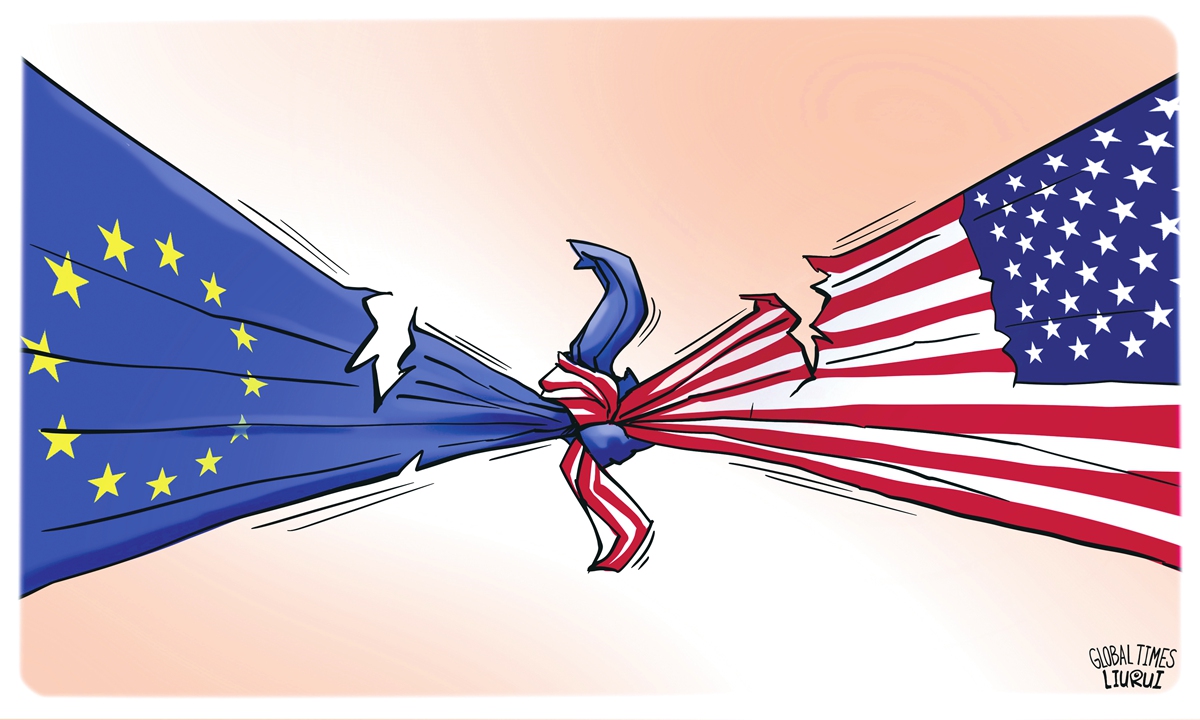
Illustration: Liu Rui/GT
Is today's US-EU alliance truly trusted? Who would have thought that today, nothing better illustrates what "trusted ally" really means than EU officials being handed burner phones before visiting the US to protect themselves from potential "espionage."
The Financial Times reported on Monday that European Commissioners and senior officials travelling to the IMF and World Bank spring meetings next week have been given the new guidance to take basic phones and laptops. "They are worried about the US getting into the commission systems," FT quoted one official as saying.
"The transatlantic alliance is over," the report said, quoting another anonymous EU official. While it may sound a bit exaggerated, the fact that Europeans now must guard against US surveillance and take extra precautions to protect themselves during their travels speaks for itself.
The EU, once ironclad ally of the US, now find itself locked in a game of counterintelligence. The bloc's cautious mode of interaction with the Washington - like walking on thin ice - demonstrates how mutual trust has withered away. This certainly makes their ties look increasingly less like an alliance.
The EU's vigilance toward the US is far from unfounded. Relevant historical episodes could fill several books. In 2013, Germany's Der Spiegel published an article, "NSA Spied on European Union Offices," which unveiled that the US' National Security Agency (NSA) not only conducted online surveillance of European citizens, but also appears to have specifically targeted buildings housing EU institutions, based on information disclosed by former US intelligence department employee Edward Snowden. Then, new details about how the NSA spied on former German chancellor Angela Merkel and her staff far longer and more widely than previously realized were continually exposed.
In 2014, Germany uncovered two Germans who allegedly were working for the US as spies. In 2023, Meta was fined a record $1.3 billion by the Irish Data Protection Commission for breaching EU rules on data privacy.
Fast forward to Monday, Europe chose to stop pretending it still sees the US as a "trusted ally." Issuing burner phones and basic laptops to some US-bound staff shows that the trust between the US and the EU has visibly and irreversibly eroded. The Financial Times casually mentions that EU's treatment of the US as a potential security risk highlights how relations have deteriorated. Perhaps, this is the true crux of the story.
In recent months, growing disappointment with the US has become increasingly vocal within the EU. This has been driven by several key issues: Washington's direct negotiations with Moscow over the Ukraine crisis, sidelining the EU, have left quite some European stunned; Europe, already facing economic challenges with limited energy supplies, material shortages, industrial decline, and high inflation, is now hit with tariffs from the US; and finally, the US government's tendency to undermine the post-WWII international order it once helped create, abandoning multilateral organizations since they no longer suit America First.
This is in stark contrast to Europe's hope to uphold the rules-based international order, multilateralism, and international cooperation.
Based on the news, the EU officials who received the guidance are from the trade and economic sectors, as they are set to visit the US for the IMF and World Bank meetings. Observers believe that the topics they will discuss are likely to be closely tied to the ongoing tariff war launched by the US.
It reveals that, in the face of an increasingly unreliable US, the EU has adopted a growing cautious stance, placing greater emphasis on safeguarding its negotiation "bottom line" to avoid prematurely exposing its core positions and sensitive data in talks with the US, avoiding an unfavorable position in future negotiations.
But when the close allies start eyeing each other with vigilance and suspicion, what's left of such an "alliance"?




